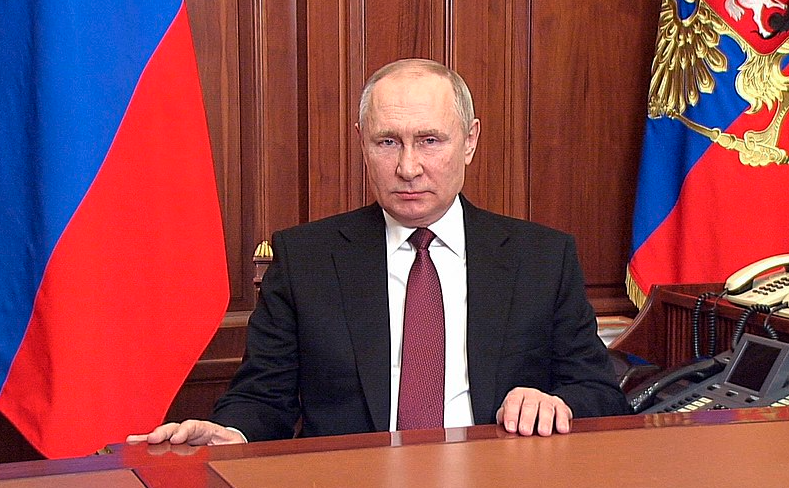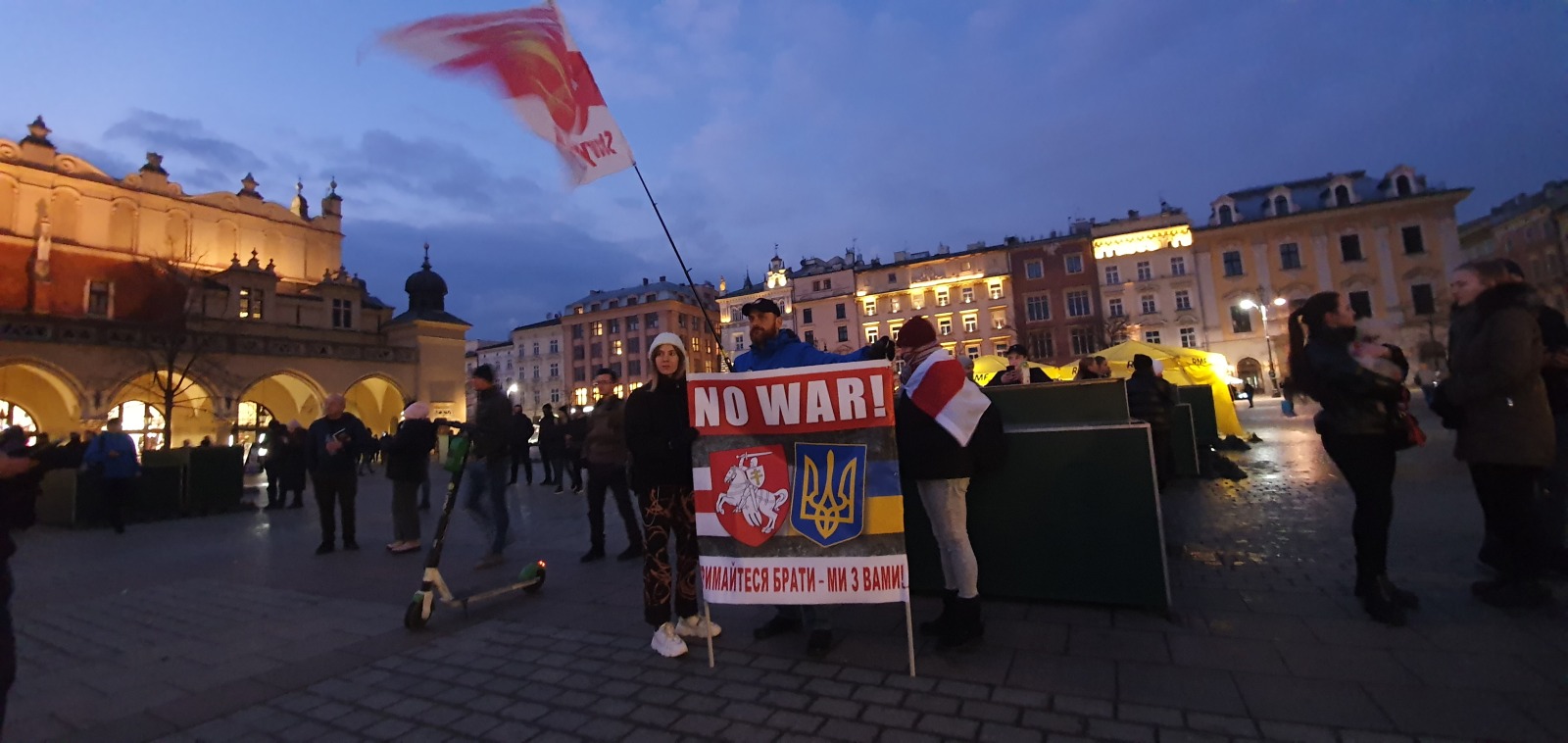News
Lessons and Consequences for Africa from Putin's Moves and Missteps in Ukraine
'There is no such thing as a former KGB man', according to Vladimir Putin, a former KGB man intent on turning back the clock to past glories. This observation is apparently also true of others who live in the past, writes Greg Mills in the second of three articles on the Ukrainian-Russian crisis.

So far there are two abiding images of the Ukrainian-Russian crisis.
One is of Vladimir Putin (69) holding court seated at one end of a long table, his guests a distance away. Two tables feature in these meetings: a 6m-long white one (at which sat, among others, French President Emmanuel Macron and German Chancellor Olaf Scholz) and another that looks like a sushi conveyor (which appears in meetings with Foreign Minister Sergey Lavrov and Defence Minister Sergei Shoigu).
It's always a formal setting, suits and ties, uniforms, plush carpets and heavy drapes, flags, flowers and portraits on the walls, all designed apparently to exude power for a man reliant on RT, Tass, Rossiya 24 and other organs of state control to project this image, and who has established a system of oligarchical patronage involving his former KGB colleagues.
In attempting to return Russia to past glories via Kyiv, Putin seems to have made what Zoya Sheftalovich describes as the *“*classic mistake” of tyrants: “Surround yourself only with sycophants, suck-ups and yes-men, and you never get a reality check in your echo chamber. Eliminate dissenting politicians, and you assume that means you've eliminated dissent.”
And then there is the image of Ukrainian leader Volodymyr Zelensky (44) at his regular press conferences in a khaki T-shirt, visiting the frontline in combat fatigues, and screening pop-up clips with his colleagues. “We are here. We are in Kyiv. We are defending Ukraine,” he said in a Telegram video shot on the streets last Friday night. He was surrounded by his close aides including Prime Minister Denys Shmyhal and the head of the ruling party's parliamentary faction.
Zelensky, previously a comedian and actor, has stayed in Kyiv despite reported offers of sanctuary in the US and France. He entered politics in 2019 on an anti-corruption campaign, after his television role as a history teacher elected as president on just such a platform in the sitcom Servant of the People.
Nobody's perfect, but Zelensky's path to power and his motives appear a world apart from his Russian rival.
Perhaps this explains why so few African leaders are reluctant to speak out against Putin's actions — they are caught between envy and fear of change.
With few notable exceptions, most African elites have, by their effective silence, presumed Putin's move will have little impact on their lives. The muted African response may have been motivated by a wish not to be drawn into a great power conflict. Alienating Russia doesn't make sense, for some, whatever the principles at stake, particularly when Africa might become a more important trade partner in the wake of Western sanctions.
Take South Africa's foreign minister, Naledi Pandor. Last week, on 23 February, she said that, while she was “extremely concerned” about developments in Ukraine, “the concerns Russia has expressed about its own security need to be taken into account…”. In an interview on SAFM, she denied that Russia was sending soldiers across an international border, and banged on about South Africa seeking a peaceful resolution of disputes, calling along the way for reform of the UN Security Council.
Pandor's pomposity was rowed back (a bit) by her Department of International Relations and Cooperation the following day when it stated: “South Africa calls on Russia to immediately withdraw its forces from Ukraine in line with the United Nations Charter.”
But then both were trumped by the ANC's Department of International Relations' statement on 27 February which (inexplicably) defended Belarus and, in calling for negotiations to end a conflict which “exposes… that the Cold War has never been taken to its grave”, completely ignored the fact that Russia has invaded a sovereign democratic country. Nor is Belarus an innocent bystander. It has allowed Russian forces to launch an attack from its territory and its own armed forces have joined in. It speaks volumes about the strength of the hold Russia has on the ANC and exposes the party badly.
The ANC might as well have thrown a naartjie at the ref, for no one takes such stump South African blah seriously any longer. The country's foreign policy was captured long before Jacob Zuma added a price tag, using Cold War nostalgia as a fig leaf to disguise State Capture, conjuring up the West as an enemy while embarking on health trips to Moscow and a nuclear power deal.
Like a Potemkin village, SA's foreign policy pretends that the country has a voice when it is faring poorly itself.
The danger with closing ranks in this way is that you miss the lessons that should be learnt from Putin's moves and missteps.
The most sympathetic explanation is that South Africa is trying to protect its membership of BRICS, as the Ukraine invasion threatens to undo the grouping. For one, it has exposed the different trajectories on democracy between China and Russia on one side, and Brazil, India and SA on the other. There are question marks too against the benefits of closer BRICS economic integration. Western sanctions against Russia will not help its already unsteady economy, beset as it is by a fluctuating oil price and an ageing population.
Frustrated by Washington's dominance in global affairs, some might also hold the West at least partly to blame for isolating and humiliating Russia since the Berlin Wall came down. For others, it raises the hypocrisy of Western foreign policy, one blogger asking why, when Russia takes military action (in Georgia in 2008 and Ukraine), it's called an “invasion”, but when the US does so (the examples cited being Iraq, Syria, Libya, Panama, Cuba, Vietnam, Laos, Cambodia) it's described as a “liberation”?
No matter how egregious the Western motivation for the removal of those listed, among other governments, the problem with this argument is that none of those removed in the latter group could remotely be considered as democratic. By contrast, the extent to which Ukraine is a democracy is perhaps best illustrated by Putin's criticism that it isn't.
Putin's model is attractive to certain African elites. It offers the prospect of rapid wealth accumulation (with the big man at the top of the billionaire pile, as with Putin) for a select few and the prospect of never losing power with no limits to personal authority and state control over all checks and balances, including the media.
Imagine, as Anne Applebaum notes, “an American president who controlled not only the executive branch — including the FBI, CIA, and NSA — but also Congress and the judiciary; The New York Times, The Wall Street Journal, The Dallas Morning News, and all of the other newspapers; and all major businesses, including Exxon, Apple, Google, and General Motors.”
While the exact consequences for Africa of the invasion are as uncertain as the military outcome, they are likely to be mostly negative — at least for Africa's peoples — for several reasons.
The first of these lies in the African adage that when elephants fight, the grass gets trampled. International markets and oil prices remain vulnerable and volatile. Also Europe, which has stood up and together diplomatically and militarily as never before, is likely to concentrate resources internally as result, both on increased military expenditure (Germany just announced a €100-billion increase in its defence budget due to “Putin's war”) and towards reconstruction and refugee flows.
Second, by declaring parts of Ukraine as independent states, Putin also undermines, as the Kenyan ambassador to the UN, Martin Kimani, has eloquently pointed out, the supposedly inviolate principle of nation-state sovereignty, raising all sorts of problems potentially for the potpourri colonial composition of African states.
It's another irony that the Chinese, for whom sovereign matters are perhaps the key feature of international relations, have lent support to Russia on these very grounds over Ukraine. President Xi Jinping reportedly told Putin that “certain international forces are arbitrarily interfering in the internal affairs of China and Russia, under the guise of democracy and human rights”.

This could provide an insight — when push comes to shove — into just how China might view African sovereignty (as opposed to its own territory) when its interests are threatened.
Third, there is a potential democracy debit. Moscow, like China, shares a common purpose towards the West, intent on disrupting and weakening relations with its allies, especially in the Middle East and Africa, but also through undermining Western democracy at home, already fraught with doubt and hampered by a combination of poor leadership and citizen disengagement.
Russia's ratcheting African ambitions and methods, which are in line with Putin's goal to restore Moscow's authority at home and abroad, link to the militarisation of his foreign policy. This model is already promoted by Russia in Africa through its example in Ukraine and more direct means, not least the activities of the Wagner private security group, active in Central African Republic, Mali and Mozambique. There are close connections between Wagner and those around Putin. Wagner promotes a view of Africa out of the 1960s — grateful locals receiving foreign mercenaries who bring stability, a view that looks away from the killings and torture the mercenaries are accused of by the UN and human rights groups.
Africans could increasingly become a target of such authoritarian tactics, including support for local political splitters. While elites might be pleased at the prospect of reducing domestic political competition, such a new world order (through disorder in large measure) is unlikely to be in Africa's overall interest given the clear longstanding empirical correlation on the continent between democratic standards and developmental outcomes. And yet it's hard to believe that those who support — alternatively, don't criticise — Putin favour the peaceful resolution of disputes, democracy, the rule of domestic and international law, and human rights.
But there is a silver lining that sensible African leadership should note.
The first is to never underestimate your foes, as Putin seems to have done. He has underestimated the Ukrainian will to fight and Zelensky's ability to lead.
This illustrates the danger of losing touch with public sentiment. Perhaps such estrangement is an inevitable consequence of being locked into the past and in historic struggles and destiny, but also reflects the absence of democracy — and the legitimacy, sensitivity and sensibility that inevitably flows from this.
As they lose touch, governments invariably pick populist short-cuts: redistributive economics, a diplomatic method aimed at remaking the world on the basis of historical imagination, the development of narratives inflating past glories, control of sources of power and information, and increasing alignment with like-minded authoritarians.
Zoya Sheftalovich asks, as a consequence, “How long will Russians continue buying into this war — a war they know Putin started, despite what their TVs might be telling them? How long will they watch videos of Ukrainian soldiers telling Russian warships to go fuck themselves in their common tongue?”
The same can be asked of those Africans who buy into the rhetoric of national liberation struggles, in spite of the obvious failings of their governments.
This article originally appeared on Daily Maverick
Photo: Wikimedia


